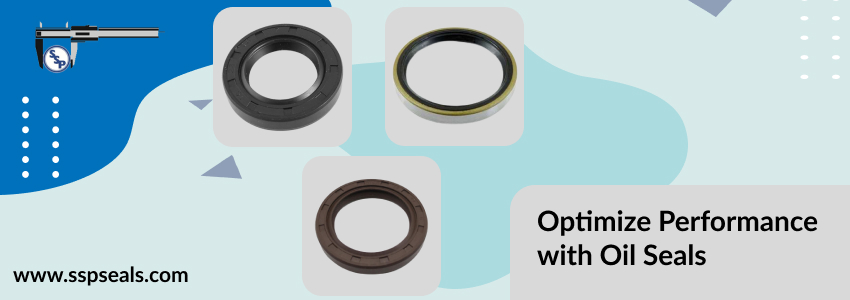Explore All About Industrial Oil Seals
Jan 08, 2024 Industrial seals | Oil Seals | Material | PTFE | LIP Seals
Oil seals, also known as oil lip seals, dirt seals, grease seals, shaft seals, or rotary seals, are used to fill the gaps between stationary and revolving parts of the equipment. They are designed to prevent the leakage of fluids from the machinery and inhibit contaminants from reaching these fluids. They contribute to the longevity and reliability of the equipment like engines and gearboxes in industrial equipment. This post discusses the importance of oil seals, the different types of materials that are used in the manufacturing of
oil seals and many more.
Overview of Oil Lip Seals
Oil seals are used to fill gaps between stationary and revolving parts of equipment, often known as radial shaft seals or rotary seals. These seals are frequently employed to keep impurities out and prevent lubricating oils, hydraulic fluids, or other liquids from escaping out of the system. An oil seal features:
- Outside Metal Ring: The seal's outside metal casing helps in maintaining its shape and offers structural support.
- Rubber or Elastomeric Sealing Lip: The sealing lip typically encloses the shaft in a tight seal formed of rubber or elastomeric material.
- Spring: Some oil lip seals incorporate a spring to apply constant pressure against the shaft, ensuring a secure seal.
Types of Materials Used for Manufacturing Oil Seals
Oil lip seals play a significant role in several industrial applications to avoid intermixing fluids and prevent contaminants and moisture from affecting the bearings. With such a vital role to play, it is essential to choose the right material for these seals. The choice of the material will depend on factors like the type of fluid being sealed, operating temperature, pressure, and compatibility with the operating environment. The following list of materials is typical for making oil lip seals:
- Nitrile (NBR): The nitrile rubber or nitrile provides excellent resistance to numerous oils and greases, including mineral grease and hydraulic oil. There are several synthetic lubricants and greases in the market based on glycol which may cause harm to NBR rubber compounds depending on their composition. Due to their excellent durability and cost-effectiveness, these seals are used in a wide range of operating conditions. However, NBR is unable to withstand exposure to acids and solvents.
- Polytetrafluoroethylene (PTFE): This fluoropolymer is known by the brand name Teflon and is known to assure the best chemical resistance and exceptionally little frictional resistance. It is the material of choice for several types of rotating seals used in the chemical, food, and pharmaceutical industries.
- Polyurethane (PU): Polyurethane seals offer excellent abrasion resistance and durability. They are suitable for high-pressure applications and provide good resistance to hydraulic oils. Polyurethane oil seals are often used in hydraulic and pneumatic systems.
- Viton: The exceptional resilience of Viton against chemicals, strong fluids, and high temperatures is well recognized and makes this a great material for creating seals for demanding applications. This material is known to maintain its flexibility, strength, and shape even in the harshest situations. When designers and engineers use oil lip seals for industry made of Viton material, their durability and dependability guarantee reduced downtime, improved performance, and a competitive advantage. It works effectively in applications involving severe chemicals, synthetic oils, and fuels.
- Ethylene Propylene Diene Rubber: This elastomer is used for creating oil lip seals for industry and other sealing elements such as U-cups. The oil lip seals made of this material would exhibit excellent resistance to steam, hot water, washing agents, and polar organic solvents. They are used to seal phosphate ester hydraulic fluids, such as Skydrol. These seals are not recommended for petroleum-based fluids, and can be effectively used with acetone, steam, alkalies, and dilute acids.

Although oil seals have been around for a while, choosing the right one still needs careful planning. If you are sure about the type of seal needed for your application or looking to replace your current seals with custom oil seals that meet your application requirements, then do not hesitate to contact the experts at SSP Seals – a leading industrial seal manufacturer in the USA. The company offers one of the most comprehensive selections of oil seals in the USA in a wide range of materials and profiles such as Type A Single Lip, Type ADL Double Lip, Type AO Single Lip, Type AODL Double Lip, Type B Single Lip Metal Case w/Spring, Type BDL Double Lip, and many more. You can visit the website for more information.
Related Post
 sales:
gm@sspseals.com
Toll Free: +1-888-238-SEAL Request A Quote
sales:
gm@sspseals.com
Toll Free: +1-888-238-SEAL Request A Quote
